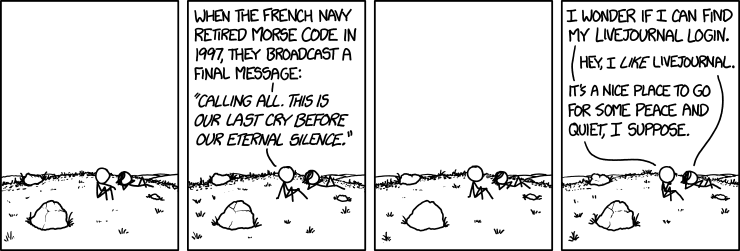Archive for Language and culture
A dog's life
Charles McFarlane, "A Dog’s Life: A Brief History of the Turnspit Dog", Modern Farmer 6/13/2014:
Today we think of working dogs as intelligent and loving creatures that are capable of amazing things — like detecting the presence of cancer through smell — but this is only a recent development in the human relationship with dogs. Little more than 150 years ago, dogs were hardly considered anything more than a power source.
At the center of this was the turnspit dog. […]
Read the rest of this entry »
Arika Okrent's column at mental_floss
Just in case you're not already a fan of Arika Okrent's columns at mental_floss, here are the last few:
11 Tragic Emotions and How to Properly Act Them on Stage (6/11/2014)
The 5 Different Linguistic Styles of Exciting Goal Calls 6/10/2014)
Why Have Baby Names Become Increasingly Female-Sounding? 6/9/2014)
5 Boring Subjects Translated Into Clickbait Headlines (5/30/2014)
Where Do U.S. Coin Names Come From? (5/30/2014)
18 Fancy Words for Specific Shapes (5/28/2014)
Vocal fry probably doesn't harm your career prospects
. . . but not being yourself just might.
There's been a lot of media interest recently in a new study of "vocal fry", sparked in part by an unusually detailed magazine article — Olga Khazan, "Vocal Fry May Hurt Women's Job Prospects", The Atlantic 5/29/2014. Other coverage: Gail Sullivan, "Study: Women with creaky voices — also known as ‘vocal fry’ — deemed less hireable", Washington Post 6/2/2014; "Is vocal fry hurting women's job prospects?", NPR Marketplace 6/5/2014; Maya Rhodan, "3 Speech Habits That Are Worse Than Vocal Fry in Job Interviews", Time Magazine 6/4/2014; and so on.
The original study is Rindy C. Anderson et al., "Vocal Fry May Undermine the Success of Young Women in the Labor Market", PLOSOne 5/28/2014. Below is a guest post by Christian DiCanio, offering a more skeptical take.
Read the rest of this entry »
Coarse grains hotel
Libin Zhang sent in the following photograph of a restaurant in Datong, Shanxi Province:
Read the rest of this entry »
North, south, east, west
Great taste
Victor Steinbok sent in this photograph of a dim sum restaurant in Boston:
Read the rest of this entry »
"Gerpanese" and addresses
Hiroshi Kumamoto received this envelope, where someone tried to translate "Herr" into Japanese and went wrong:
Read the rest of this entry »
"Peak X" abides
Following up on "Peak X", 10/14/2008, O.C. sends in a link to "Twitter (Finally) Invents Revenue Stream", Marketing Vox 5/5/2014 (emphasis added):
In an honest-to-goodness innovation, Twitter has constructed a mechanism by which people can add items to their Amazon shopping carts by tweeting in response to things such as revenue-raising advertisements. There may be hope yet that even with Peak Twitter talk afoot, a serious revenue stream could launch the firms revenues to heights commensurate to the firms self-perceived importance.
Read the rest of this entry »
Draft words
Reuben Fischer-Baum, Aaron Gordon, and Billy Haisley, "Which Words Are Used To Describe White And Black NFL Prospects?", Deadspin 5/8/2014
Do NFL scouts talk about white players and black players differently? Are certain words reserved for white players? Are others used primarily to describe black players?
Let's try and find out. We've pulled the text from pre-draft scouting reports from NFL.com (written by the infamous Nolan Nawrocki), CBS, and ESPN, split them by player race, counted the number of times individual words appeared using the Voyant tool, and then calculated the rate at which each word appeared per 10,000 words. (In total we pulled 68,465 words on 99 white players—6,228 unique—and 223,868 words on 288 black players—10,580 unique). You can play with the data in the interactive below; simply plug a single word into the input field, hit search, and see how often the word appeared in black and white scouting reports.
Read the rest of this entry »
Not permission, to violate to punish
Photograph of a sign in Taiwan from Jason Cox, whose friend posted it on Facebook:
Read the rest of this entry »
The last txt, the last tweet
A recent xkcd:
Morse code was first used for telegraphy in 1844. I'm not sure when the French navy started to use it, but I understand that transmission of Morse code by radio began in the 1890s, so if that last plaintive message was sent in 1997, Morse code in the French navy would have had a run of just about 100 years. LiveJournal was started in April of 1999, and of course some people still use it, but it flowered and faded in the U.S. over a period of about a decade: "In January 2009 LiveJournal laid off some employees and moved product development and design functions to Russia", according to Wikipedia.
Yesterday I attended a workshop on Social Media Data at the Annenberg Public Policy Center, and it occurred to me to wonder what the social media landscape will be like ten years from now.
Read the rest of this entry »
No word for "I" or "me" or "mine"
A.S. sent in this quotation from Jeremy Fogel, “A Reasonable Expectation of Privacy”, Litigation Journal, Spring 2014:
Different cultures understand privacy in different ways. In societies in which large numbers of people typically live in close proximity to each other, often in very small spaces, very little truly is understood or expected to be private. There are entire languages without words for “I” or “me” or “mine.”
Read the rest of this entry »






